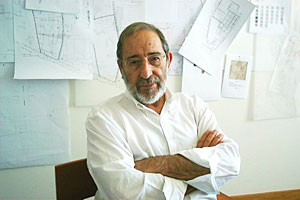Alvaro Siza, the quietly respected Portuguese architect, is the recipient of the 2009 Royal Institute of British Architects (RIBA) Gold Medal. The award honors a body of work amassed over a lifetime that has had an international influence. Siza will receive the award at a ceremony at RIBA’s Florence Hall in February.

“He’s a very complete and profoundly thoughtful architect, and it’s high time he got the RIBA Gold Medal,” says RIBA President Sunand Prasad. “There’s no question that Alvaro Siza is of world stature, although he may not be so well known to architects globally, especially since we live at a time in which kitsch gets column inches and serious work often does not.”
This is not Siza’s first prestigious award. He won the Wolf Prize in 2001 and the Alvar Aalto Medal in 1988, as well as the Pritzker Prize in 1992. Unlike many jet-setting and flamboyant Pritzker laureates, Siza has crafted a body of work that resides mostly in Europe and the Iberian Peninsula, near his home in Porto, Portugal. His work encourages contemplative and deliberate experiences of space through the use of simple materials. The stark, unadorned presentations of these materials draw comparisons to Minimalism, though Siza’s buildings often offer unexpected geometric abstraction. The latest example of his Modernist oeuvre is the recently completed Museum for the Ibere Camargo Foundation in Porto Alegre, Brazil. Other major projects include his Municipal Library at Viana Do Castelo, Portugal (2007), and the Santa Maria Church at Marco de Canavezes, Portugal (1996). His only structure in Britain was a temporary Serpentine Gallery Pavilion built in 2005.
Speaking from his office in Porto, Siza said the award announcement “was a surprise, but a good surprise.” Despite this most recent honor, the 75-year-old architect says he’s still more interested in guiding a practice based on modesty and longevity. “My ambition is to go on working, [not for] 100 years, as Niemeyer, but, well, some time more.”
Read about the winner of this year's Stirling Prize, announced on October 11, 2008.





Post a comment to this article
Report Abusive Comment